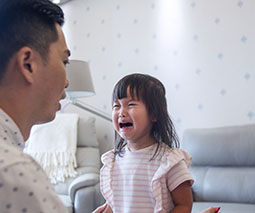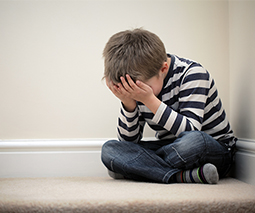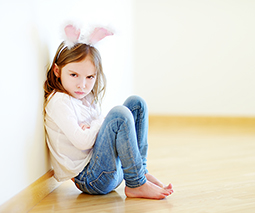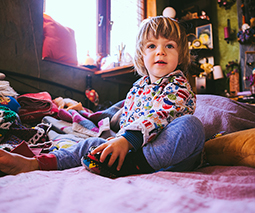The condition child psychologists see most in their clinics

It’s a common reason why parents seek help for their children, but not many people know what oppositional defiant disorder (ODD) is.
“One in every class”
“Most people haven’t heard of it, which is strange. It’s one of the most common reasons that parents seek help from child mental health services,” says Dr Caroline Moul, who is from the School of Psychology at Sydney University and the Co-Director of the Seedling Lab.
“It’s about five percent in Australia. So about one in every class is the easy way to think about it.”
Listen to Caroline Moul on Feed Play Love:
What is oppositional defiant disorder
Diagnosing ODD can be tricky because the behavioural signals are actually quite common in small children.
“A child is diagnosed with ODD if for six months or more they’d had a pattern of behaviour that could include things like being angry, moody or tantrumy,” Caroline explains. “It could also include defiant disobedience, not doing what they’re told, breaking the rules and being kind of annoying to people on purpose.”
“What’s hard about describing this is you know every single child at some point will do all of those things.”
But as Caroline points out, the significant part of an ODD diagnosis is that the behaviours have been present for six months or more and occur more frequently than other children in the same developmental age range.
What causes oppositional defiant disorder?
The causes for ODD are unknown, but lots of things are thought to be associated, such as biological and genetic factors, the personality of the child, and their environment. But it’s not quite that straightforward.
“You can have a family with three children, two of whom have no behaviour problems whatsoever … but one of them will have severe behavioural difficulties as I’ve described,” Caroline says. “So you can’t really say that it’s just the family environment or it’s just the parenting.
“I think people want it to be that simple. They want to see a parent and basically judge them and say, ‘your child’s behaving like that because you’re doing something wrong in the way you’re parenting’ and it’s not that simple.
“There’s no such thing as perfect parenting behaviour; it doesn’t exist.”

How do you go about treating ODD when it’s so complex?
Caroline says the best thing you can do is something called Parent Management Training, which is exactly what it sounds like. Essentially, Parent Management Training teaches parents different ways to respond to their child, including how to encourage behaviours they want to see and discourage behaviours they don’t.
The child won’t see the clinician much at all and as a result, there is some ‘stigma’ surrounding the treatment, with many thinking that because they are an important part of the treatment that they must have been a part of the problem too – which isn’t necessarily the case.
“It sounds really weird, and I think that’s partly where the stigma comes from,” says Caroline. “It’s changing what you are doing as a parent, and it’s hard work. And that, I think, makes it seem like that’s where the problem comes from.”
But just because parenting is part of the solution, doesn’t mean it was the cause.
The aspirin effect
“Think about the aspirin analogy,” says Caroline. “If you have a headache and you take an aspirin, the aspirin gets rid of your headache. But you don’t have a headache because you’re lacking in aspirin.
“So the way you fix something isn’t necessarily what the problem is in the first place.”
Additionally, if you’re worried about your child’s behaviour, Caroline has this piece of advice for you: “Don’t listen to your friends, don’t listen to your mother-in-law; go and get an actual, genuine assessment from a child clinical psychologist or a paediatrician.”
 Need some toddler behaviour advice? Our Parent School toddler experts can help. Click to find out more or book a one-on-one session.
Need some toddler behaviour advice? Our Parent School toddler experts can help. Click to find out more or book a one-on-one session.









